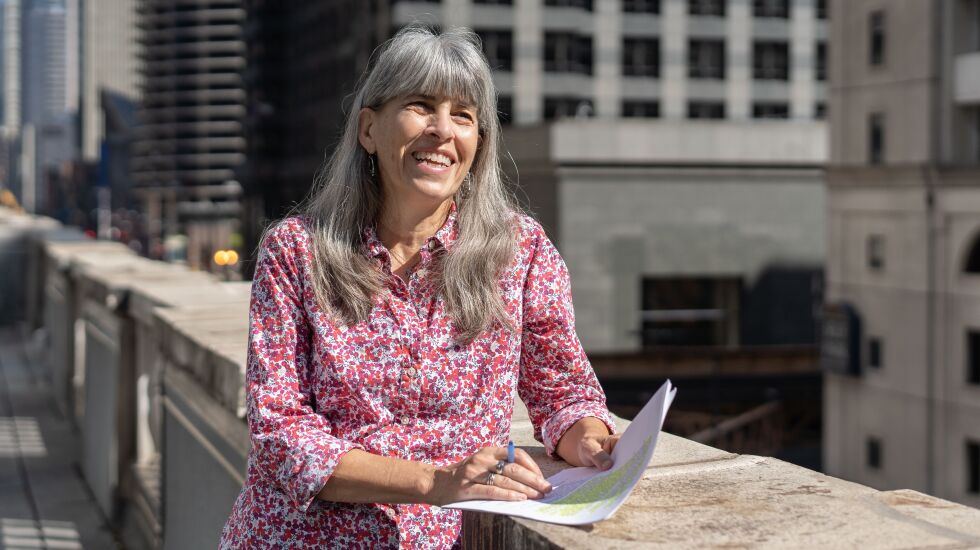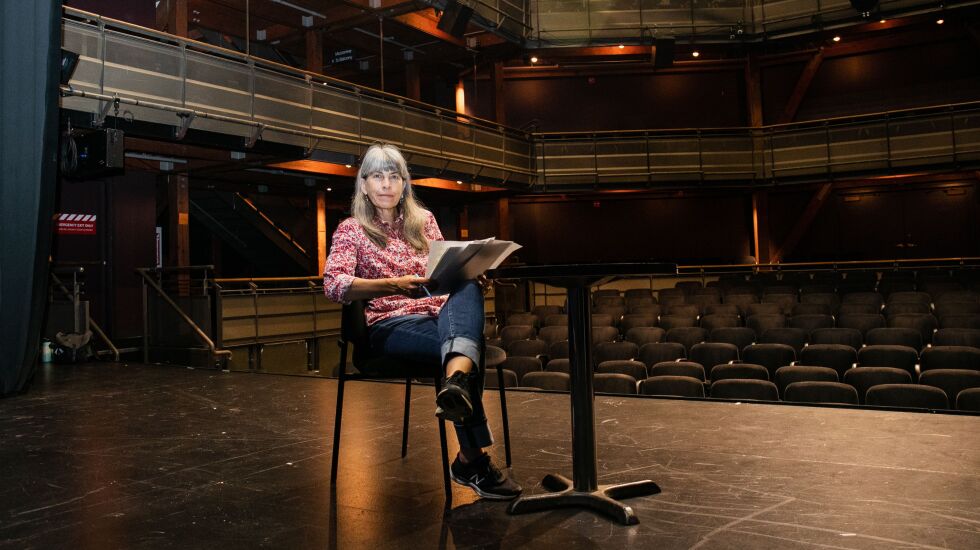
Shakespeare? O’Neill? Chekhov? Were you to make a pie chart of all the playwrights the Goodman Theatre has produced over the past quarter-or-so century, the circle wouldn’t be dominated by any of the above. That honor goes instead to Alabama-born Rebecca Gilman.
“Swing State,” her politically-fueled drama opening Oct. 7, marks her 10th production at the Goodman since 1999, and the sixth helmed by artistic director Robert Falls.
Gilman vividly recalls her first meeting with Falls in the late 1990s. He hadn’t seen her first produced play, a drama about a serial killer and the girl he used to help him target prey. But when “The Glory of Living” landed on Falls’ desk after a short 1996 run at Forest Park’s tiny (and now defunct) Circle Theatre, Falls wanted to hear more from its author.
“We had lunch at some really fancy restaurant, at the end he asked me what I was doing for the rest of the day. And I was like ‘I’m going back to register at the temp agency.’ I’d been working as an administrative assistant. That afternoon, I got my first commission from the Goodman,” Gilman recalled during a recent chat.
“Swing State” is set in summer, 2021, in a tiny Wisconsin town, not wholly unlike the one Gilman calls home in a rural area near New Glarus. The plot follows neighbors on opposite ends of the political spectrum, all trying to survive in a post-pandemic world where something as small as a bumper sticker can spark vicious, futile discord — or worse.
In mere synopsis, “Swing State” sounds — as do many of Gilman’s plays when abbreviated to plot points — heavy, potentially grim and more about provoking thought than providing entertainment. Gilman’s earlier works at have taken on racism (“Spinning into Butter”), stalking (“Boy Gets Girl”), natural disasters (“A True History of the Johnstown Flood”), meth addiction (“Luna Gale”) and police corruption (“Blue Surge”). But time and again, Gilman infuses humor and humanity into even the most corrupt characters.
“When I write, I try to work through things that are really bugging me, making me angry or sad. And then I try to make it as funny as I can,” Gilman said.
“I feel like we’re all experiencing some collective trauma from the pandemic,” she continued. “And from the threats to our democracy. And climate change. Obviously, these are huge topics. You can’t take them all on in a play. So I decided to look at one person’s attempt to reconcile her anxiety and grief at a specific, really difficult time,” she said.
In “Swing State,” that person is Peg, a high school counselor (Mary Beth Fisher, in her fourth Gilman production at the Goodman). Gilman won’t divulge plot details, save that an early twist puts Peg and her ex-con neighbor on a collision course with the local sheriff (Kirsten Fitzgerald).
“Swing State” was borne in part from Gilman’s own experiences trying to navigate rural Wisconsin after decades of living in Chicago.

“I live kind of in the middle of nowhere. There’s four houses on my road. It’s personal, but impersonal. We don’t talk about politics, but I think we can all guess where each other stands,” she said.
“But this thing happens when there’s so few of you and you need to help each other — somebody has to help get that tree out of the middle of the road. Or if the power goes out, if there’s a blizzard that closes the roads, you have to be able to rely on each other. You know you need each other, even if you’re violently opposed ideologically,” she said.
“Wisconsin is so evenly divided,” she continued. “It’s been like that for a while but over the past four years it’s become even more so. You find yourself wondering. Should I even make eye-contact with that person at the gas station? If I put this bumper sticker on my car, is someone going to say something, could it provoke something? I was talking about this to Bob (Falls) during the pandemic and he was like, ‘I think you need to write a play.’ ”
Gilman’s passion for conservation also plays into “Swing State.” An avid bird watcher and a board member for the Wisconsin Society for Ornithology, Gilman and once spent a sabbatical year living in North Dakota cabin built during the Civilian Conservation Corps as a volunteer for the U.S. Fish and Wildlife Service.
“One of the women I’ve been bird-watching with for years calls what we’re seeing — or not seeing — ‘a different kind of silent spring,’ ” Gilman said. “I think with the pandemic, the environment, the political divisiveness — people are trying to find ways to save what they love. That’s what I wanted to explore with the play. How do you save the things you love? How do you even begin?”
“Swing State” is one of two productions Falls directs this season, his final as artistic director at the Goodman. He’ll be succeeded by Susan V. Booth, who brought the “Glory of Living” script to Falls when she was working as the Goodman’s literary development office.
“I was taken, immediately,” Falls said of Gilman’s writing. “I think our voices merged in some ways. We didn’t plan for her to become the most produced playwright at the Goodman. But we formed a truly unique theatrical partnership.”



.png?w=600)



